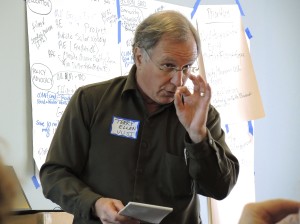
I’d like to share with you why the Pope’s encyclical on climate is so important and what we can do in support.
I began my interest on climate when the evidence became clear that our warming world was having disastrous consequences for the poor, marginalized, and most vulnerable – children of course included – but also for all the other species, future generations, and, even with the buffers of privilege included, all of us. It struck me then as the biggest moral issue facing us, but when Bill McKibben added “You can’t negotiate with the laws of physics,” the pressing time limit turned a moral issue into a crisis.
It didn’t help learning that the seas were taking the heavy CO2 hit, masking the effects from us while acidifying and warming them, risking the whole food chain there. It didn’t help learning that our easily-disrupted food supply was humanity’s Achilles heel with warming, It didn’t help learning that between 50-80% of fossil fuel reserves would have to be left in the ground to achieve the maximum “safe” limit of 2 degrees Centigrade rise by 2100, thus directly taking on the profits of the largest corporations in history, which dominate our political process. It didn’t help learning that science, because of its rigorous process of funding, research, peer review, publishing, was always about six years behind the ball.
The dramatic, devastating weather events made it clear this was no longer the nature we had all grown up with. . .
Then, finally, things began to change for the better, bringing real hope. The dramatic, devastating weather events made it clear this was no longer the nature we had all grown up with, so the public began to get it. And, secondly, climate change began to be seen not as a remote issue of science, but as a moral issue.
Thus, rather quickly, faith traditions were welcomed at the discussion table on what we should do. And, wonderfully, it turns out moral arguments are the most powerful ones of all: moral issues we get in our gut. And moral issues belong to us all, together, beyond politics and certainly beyond greed.
And now the Pope’s June encyclical on climate change and visits to Congress and the U.N. in September have the potential to morally impact more people than ever before. And that is why it is so important that we UUs raise our voices in support to help make this an interfaith consensus. The timing is crucial, coming just before the talks in Paris in December.
What can we do? Specifically, the UUA is working on a written response to the encyclical. There is also a proposed Resolution of Immediate Witness, http://climate.uu-uno.org/, coming up at General Assembly urging us to do all we can for a strong US commitment to action in Paris. And UUSJ and area UUs are working on supporting events for when the Pope comes to D.C., from a moral march for climate justice on Sunday, Sept. 20, to following visits to the Capitol in witness to the moral need for appropriate, urgent, action to vigils, religious services, and moral witnessing events at the Lincoln Memorial Reflecting Pool when he is in town the 23-24 (www.moralactiononclimate.org). Further, Faith Alliance for Climate Solutions (Fairfax County, faithforclimate.org) provides a model for how UUs can help mobilize local interfaith action. Citizens Climate Lobby is working on legislation in Congress.
This is a pivotal moment for addressing this most pressing issue, and our whole faith tradition cries for us to be fully present. But this time it is essential we act with others, for on this one we are all in the same boat and need each other like never before.

